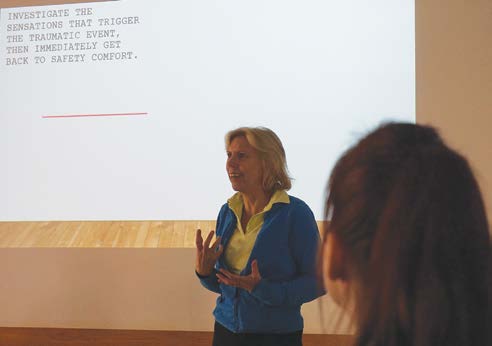Trauma workshop tackles warning signs, treatment
Posted on March 15, 2018 by Maple Creek PHOTO SARAH VERMETTE Cynthia Rodgers presents at her co-facilitated workshop for trauma education in Maple Creek on Saturday March 11.
PHOTO SARAH VERMETTE Cynthia Rodgers presents at her co-facilitated workshop for trauma education in Maple Creek on Saturday March 11. by Sarah Vermette
A trauma workshop called “Hidden Voices: Speaking our Truth,” was held last Saturday at St. Mary’s Anglican Church in Maple Creek. Co-facilitated by Cynthia Rodgers, a child advocate, and Janet Rhodes of Maple Creek, this workshop focused on educating people how to recognize and treat trauma, a multi-faceted issue that is often misunderstood.
“We tend to be judgmental about people with addictions,” said Rodgers. She went on to explain that approximately 75 per cent of people with addictions have a background that includes abuse or trauma.
Rodgers, who worked in the school system as a counsellor for 30 years, said Health Canada released a report in 2014 that showed 80 per cent of at-risk youth do not receive the help they need. “I felt I had to speak out for the children,” she said.
Rodgers noted children with behavioural issues should not be taught the same way as well-adjusted children. They must be treated in relation to their brain age — determined by their behaviour — rather than their physical age. Rodgers said punishment tactics can often make things worse and suggests finding activities that will help children develop self-esteem and confidence.
At-risk youth often become those who end up in the prison system as adults. Ian Rhodes, Janet’s husband and a supporter of this type of education, said he’d like government funds to be used to create programs aimed at education and prevention, rather than so much funding going towards punishment, or “damage control,” as he calls it.
He added that by learning more about trauma and violence, people are better equipped to avoid this type of behaviour. “[The workshop] is going to teach people how to not pass it on to their children,” he said. Trauma that has not been dealt with is often passed on generation to generation.
When speaking about how the brain of a child deals with traumatic situations, Rhodes explained that punishment itself can often be traumatic. She said this can be minimized or avoided by taking a different approach where the punishment is clearly explained so the child understands the reasoning. In order to understand how to correctly take this approach, people need to learn more about the topic. For example, Rhodes explained that when a child is in panic or survival mode, they literally cannot hear what’s being said to them. The focus should be on getting them back to an emotionally safe space before trying to have a discussion about the issue at hand.
Whether a child or adult, validation is key for someone experiencing trauma. A common reaction when hearing about something uncomfortable is to get to a safe space. Mentally, this happens by denying someone his or her validation or disassociating from the experience. Understanding this common response is key to understanding why so many who come forward about abuse are denied validation by those they seek help from, from personal relationships and even from professionals. With children, this lack of validation to their emotional response of a traumatic experience can cause, as Rhodes said, “Further brain damage.”
Janet says she experienced first-hand how the justice system re-victimizes people by making them rehash and relive their trauma. “It often feels like the victim is the one who’s on trial,” said Janet. Having experienced trauma in her first marriage, she is concerned about youth. “This is already happening in relationships at a high school level,” she said. She would like to see the education system focus on providing awareness about violence and trauma, and develop programs aimed to help youth develop their self-esteem.
Rodgers says she hopes attendees, many of whom are parents, will start putting pressure on politicians to pay attention to this issue and ask for programming geared to educate the general public and professionals.
Rodgers and the Rhodes’ hope to offer these workshops more often in the future as a continued part of their outreach.
Janet Rhodes has dedicated her life to helping others escape and heal from domestic violence. She currently runs Freedom Within, an online help forum with 10,000 subscribers.
Cindy Rodgers is a child advocate. She authored, Believe Children: Understanding and Help for Children with Disordered Behaviour.


Leave a Reply
You must be logged in to post a comment.